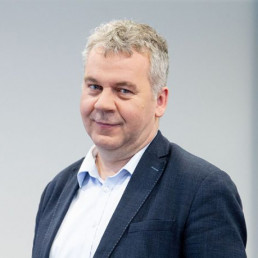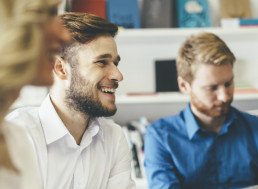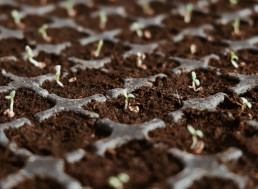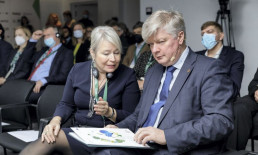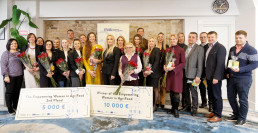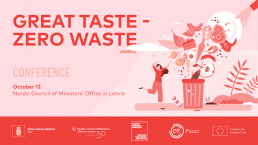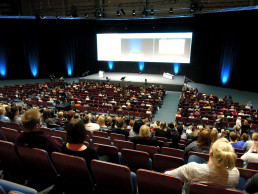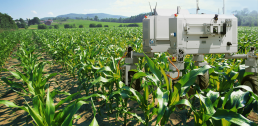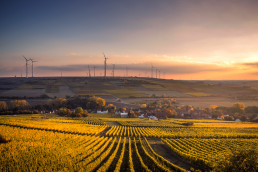EIT Food Accelerator Network
About EIT Food Accelerator Network
The EIT Food Accelerator Network (EIT FAN) is a four-month programme that aims to fast-track science and technology-based innovations that are helping to solve global food system challenges. The programme is managed by our leading EIT Food partner organisations, operating from different regional hub locations Europe. Each hub connects impactful agrifood startups with industry-leading corporate and research partners, to pilot innovative technology and drive the ultimate goal of every business: a successful market adoption
This is your opportunity to move your startup beyond acceleration – to become part of a rich ecosystem of business and research institutions, setup to help you transition from an early-stage company to a global scale up, disrupting and our food system to make it more sustainable, healthy, and trusted.
So, what are you waiting for? Apply to EIT FAN to further develop your entrepreneurial skills and benefit from expert coaching and mentorship. You will also have access to specialist facilities such as labs, pilot sites, maker spaces, and agricultural land, as well as financial support to help you raise your seed or series A investment round.
EIT FAN eligibility criteria
- Your business innovation must be underpinned by a science or technology with a proof of concept, or pilot project execution.
- It must fall under one of EIT Food’s key focus areas: Sustainable Agriculture, Sustainable Aquaculture, Alternative Proteins, Digital Traceability, Circular Food Systems, Targeted Nutrition.
- Your company must be at a pre-seed stage (you must not have closed a Series A investment round yet), and ideally, it has successfully completed customer validation and is able to demonstrate traction, for example, through letters of support, sales, or signed letters of intent.
To apply for EIT FAN you must be a registered company established in an EU member state, or Horizon Europe associated countries.
Funding
The EIT FAN offers funding of up to €10,000 along with the opportunity to access follow-on EIT Food funding and support through EIT Food’s Impact Fund. More information on this fund can be found here
F.A.Q
Programme Applications are open from the beginning of January to the end of February each year, and all applications are evaluated from March-May. Up to 60 startup teams considered to have the highest impact potential are then selected to join the new cohort. EIT Food regional hubs run the programme from June to October and all selected, participating teams are required to attend regular training sessions during its course.
All selected, participating teams are required to commit at least 10 hours a week during the course of the programme. To take advantage of all what the EIT Food Accelerator Network has to offer, and to minimise travel (due to Covid-19 restrictions), our hubs facilitate the programme mostly online. Simply choose the elements that work best for you: the online events to attend, the mentors to meet with, the partners to network with, and the information sessions to participate in. Whilst we offer this flexible approach, please note we DO expect at least one team member to remain active, and to be engaged with the programme during its full course, from when it starts in June, until it ends in October. Please note, each hub varies in how they design and structure the FAN programme so please contact a specific EIT Food regional hub for more information.
Applications are assessed based on the understanding of the food system problem, its commercial solution, and your company’s fit with our ecosystem. Equally important is the potential impact of the innovation, its technology readiness, the business model, its USP, and the dynamics of the founding team
Please refer to our programme Terms & Conditions for more detailed information.
We provide direct access to experts who fundamentally understand the commercial potential of science and technology in the agrifood sector. You will be joining Europe’s largest agrifood startup community to receive continuous support from other like-minded entrepreneurs, with endless opportunities to share knowledge and work closely with our world leading industry partners.
projects and follow-on funding, to support their commercial roadmap, which may include pivoting or spinning out with suitable identified partners. There is also the possibility to become an EIT Food RisingFoodStar, which supports the scaling of impactful agrifood startups ready to enter international markets.
*For more detailed information about EIT FAN, please refer to the programme Terms and Conditions
Seedbed Incubator
About Seedbed Incubator
The Seedbed Incubator is a six month programme that aims to transform science and technology based innovations, that can help solve global food system challenges, into market-validated businesses. The programme is delivered by world-class EIT Food partner organisations.
All entrepreneurial teams and newly-formed startups accepted onto the Seedbed Incubator receive funding and access to our thriving ecosystem to facilitate market testing activities with potential customers or end-users. Each cohort team is supported by business coaches and sector experts to be ready a successful business launch
The Seedbed Incubator will enable you to identify and connect with key customers, test the market and take your minimum viable product or service from a commercial proposition to a validated business.
Benefits of Seedbed
The EIT Food Seedbed Programme provides participants with world-class start-up training and coaching to identify their core business assumptions and the support to refine their business value propositions. Seedbed Hubs provide participants with the skills, personalised business coaching, industry connections and funding to test innovative ideas directly with 100+ potential customers and end-user. The programme includes:
- Training at a 4-day online bootcamp based on a unique customer-oriented methodology to allow participants to define clear value propositions; winning business models, and a market validation plan to better understand the needs of the market and develop a solution customers are willing to pay for
- Coaching from seasoned entrepreneurs and leading experts in the agrifood sector
- Funding of up to €6,000 to facilitate market testing activities and to speak to potential customers, stakeholders and end-users to validate business ideas; plus the opportunity to access follow-on EIT Food funding and support through the Startup Launch Grant.
- An opportunity to pitch to a panel of industry experts and receive constructive feedback.
Ultimately, Seedbed is designed to produce independent, creative, and market-aware entrepreneurs with the necessary multi-disciplinary skillset to address not only key challenges in the agri-food sector but make important contributions to ensure our food system is secure and trusted. Most importantly, our teams finish with a validated business model primed for attracting follow-on support and investment that will help take their proposition closer to market. As a Seedbed alumnus, you’ll have continued access and opportunities within the EIT Food network including access to EIT Food investment schemes.
Who Should Apply?
Are you doing or supporting research that has commercial potential? Have you got an innovative technology that could revolutionise the food system? Then our Seedbed Incubator Programme could be for you!
The EIT Food Seedbed Programme is focused on supporting three participant groups with business propositions underpinned by science and technology, that could transform the food system:
- Entrepreneurial Teams seeking to validate the commercial potential of their innovation
- Science Entrepreneurs seeking to validate the commercial potential of technology they are developing as a student, academic or employee at a Research Organisation or University
Recently incorporated companies (spinouts or startups, typically less than a year old) seeking to validate the commercial potential of their innovation
What are the eligibility criteria?
Be eligible for the programme potential participants must meet the following criteria:
Business propositions must be underpinned by scientific or technological innovations with proof of concept established. They must fall under one of the six of EIT Food’s Focus Areas i.e.
- Sustainable Agriculture
- Sustainable Aquaculture
- Alternative Proteins
- Digital Traceability
- Circular Food Systems
- Targeted Nutrition
If applying as a team: one of the founders must be a citizen or resident of an EU member state or associated countries.
If applying as a startup: company must be established in an EU member state or associated countries.
Funding
Funding of up to €6,000 to facilitate market testing activities and to speak to potential customers, stakeholders and end-users to validate business ideas; plus the opportunity to access follow-on EIT Food funding and support through the Startup Launch Grant.
F.A.Q
The program is limited to 2 team representatives.
Yes, but an individual academic entrepreneur or solo researcher should have support from one member of their Technology Transfer Office, whose contact details should be included in the application.
Applications are assessed against the following criteria: eligibility, motivation, problem validation, solution fit, technology readiness and USP, potential business model, and team.
When the Seedbed programme is completed participants become a Seedbed Alumni and have the opportunity to access follow on funding to support their commercial roadmap. This may include spinning-out or starting-up a new company, or establishing technology feasibility tests with identified partners. There is the possibility to progress to the EIT Food Accelerator Network (EIT FAN), which connects impactful agrifood startups with industry-leading corporate and research partners to pilot their technology and drive the ultimate goal: a successful market adoption. Visit eitfan.eu for more information.
A number of incubator programmes that exist are generic and they have general market validation programmes. Seedbed gives direct access to the agrifood sector and sector experts across Europe which is crucial to understand the commercial potential of a technology in this sector.
* For more detailed information about the Seedbed Incubator, please refer to the programme Terms and Conditions
RisingFoodStars
Scaleup your business across borders!
Have you got a growing agrifood tech scale-up ready to become the international game-changer of the future? Then this programme could be for you!
The programme addresses early scaleups that are past the ideation phase, have paying customers and are poised for significant growth and global scale. RisingFoodStars them grow and scale impact faster – from market testing new ideas, providing support from experts, connections to corporate partners across the food industry and access to investors.
F.A.Q
The higher goal of the RFS network is to facilitate and stimulate collaboration and cross-fertilisation between RisingFoodStars, the members of EIT Food, and external parties.
The value proposition includes:
- Easy access and personalised introductions to world-leading corporates, academia, investors and research organisations
- Increased visibility through accessing high-impact international agrifood and startup events and our own social media
- Backing from a ‘trusted network’, including names as Pepsico, Danone, Nestlé, Cambridge University, and TUM.
- Individual support to scale up, raise investment, and tackle typical startup growing pain points
Membership comes in terms of three consecutive financial years against a fee of €3.000 per financial year. We waive the fee for the accession year
We welcome all companies that at the submission stage, identify with the following:
- You have your legal entity based in a member state of the European Union (EU) or Horizon Europe associated countries. Switzerland and UK-based companies are eligible to apply. However, eligibility to receive funding will be determined based on Switzerland’s and UK’s eligibility status for EU funding at that time.
- You are a SMALL sized company as defined in the EU recommendation 2003/361 (between 5 and 49 employees and less than 10 million turnover or balance sheet)
- You expect to conclude a Series A within the next 6-12 months or you have recently raised a Series A
- You are past the ideation phase, with preferably paying customers and at least a product-market fit in your home market
- You have a technological solution within one of the six key focus areas of EIT Food
- You have the ambition of strong growth, and your next milestone is to scale your business across borders
- You complement the current pool of RisingFoodStars and EIT Food partners, and you can add value to the network. The current list of members is available here
- You are not involved in another EIT Food Entrepreneurs programme, i.e. Seedbed Incubator or the EIT Food Accelerator Network
- You have no conflict of interests. Ventures owned by EIT Food employees or members of EIT Food governing bodies and engagements in which EIT Food employees or members of EIT Food governing bodies have an interest are also excluded. EIT Food includes all CLCs of EIT Food and all governing bodies.
Interested candidates must first join our community to check if they pass the programme’s eligibility criteria. Once this is passed, you will be invited to complete your application, and after your answers are submitted, we will evaluate your application and submit it to the Advisory committee. Some applicants might be invited to an online pitching and Q&A session. The Board of the Association RisingFoodStars will issue a final decision on the acceptance of applicants to the RisingFoodStars network
For more details, refer to the Terms & Conditions
Programme applications are open from the beginning of January to the end of February each year, and all applications are evaluated from March-May
Our RFS manager undertakes an annual evaluation of the RFS members to assess their eligibility to remain a member of the association based on the following criteria:
- You must be supporting the aim of the EIT Food RisingFoodStars programme
- You must still be directly or indirectly active in the food sector, in one of EIT Food’s key focus areas
- You must be involved in a minimum of 3 x EIT Food activities in one financial year, such as KAVAs and/or other activities, including podcasts, FoodUnfolded, and various external representations of EIT Food RisingFoodStars trainings etc. external
- You must attend EIT Food (supported) events
- You must be showing signs of growth and progress
* For more detailed information about RisingFoodStars, please refer to the programme Terms and Conditions
The message of the AgriFood Forum 2021 was heard: it is time to take action
On November 25, the AgriFood Forum 2021, the largest international conference on the agrifood sector in the Baltic States, took place in Vilnius. Last year, this annual event, which brings together science, business and political leaders as well as the social partners, took place online, two years ago - a physical event was held. This year a new - hybrid - format was proposed. One hundred special guests and 2,000 online viewers spent eight hours listening for presentations and discussions, which took place in two different halls, by almost 50 leaders on a wide range of topics from regional development, innovative food, the future of the EU agricultural policy or robotics to women's empowerment, green investment, ecosystem transformation, decarbonization and future visions of the agrifood sector in Lithuania.
“For the first time, the AgriFood Forum in Lithuania was characterized by such great interest from representatives of different sectors, decision-makers of various public authorities and actors of the local innovation ecosystem. This year, the forum attracted the largest number of influential agrifood sector actors not only from Lithuania, but also from the European Union and all over the world. During the discussions and presentations, we heard clear suggestions on what needs to be done if we want to implement a sustainable food value chain in Lithuania, solve regional problems and create a better innovation ecosystem both at the national and EU level, ” said Kristina Šermukšnytė-Alešiūnienė, the director of the AgriFood Lithuania DIH.
The Speaker of the Seimas of the Republic of Lithuania Viktorija Čmilytė-Nielsen, who gave a welcome speech at the Forum, said that sustainability is not a limitation. Sustainability is about maintaining balance with nature. It is qualitative growth. During his presentation, the Minister of Agriculture of the Republic of Lithuania Kęstutis Navickas highlighted the necessity of changes in the current living standards of the society. According to the Minister, it is the buyer who should be most interested in seeing as many sustainably produced products as possible on store shelves and have the greatest intolerance for food waste. Meanwhile, the Minister of Environment of the Republic of Lithuania Simonas Gentvilas stated that he believes that the food sector in Lithuania can be without a trace of CO2.
According to Augustas Alešiūnas, the director of ART21, there is a strong public desire to take care of a sustainable environment and food. Therefore, we should not ignore this strong initiative and take responsibility - both as a country and as a society - for a sustainable future. The innovator encouraged science to take the lead in uniting different actors, because, in his opinion, it is unlikely that we will succeed in achieving our goals if we have many different options, but do not have a clear strategy. This way the need for a common strategy in Lithuania was highlighted.
"In the past, all technologies were dedicated to increasing productivity and efficiency. The technologies being developed today are more than just productivity-oriented, with climate change becoming another key issue. Indeed, we would certainly not lie if we called AgriFood Tech Climate Tech,” said Louisa Burwood-Taylor, the Head of Media & Research at AgFunder, who introduced global trends based on personal experience, statistics and future perspectives.
The winners of the EIT FOOD EWA project in Lithuania have been announced
On November 11, the EIT FOOD Empowering woman in AgriFood project in Lithuania reached its finish line in the most luxurious hotel in Vilnius Pacai. During the event, ten young innovators presented their diverse ideas - from dog perfumes to alternative protein products - that they developed over six months with the help of experienced mentors. According to the patron of the project in Lithuania Kristina Šermukšnytė-Alešiūnienė, who is the Director of the EIT FOOD Center in Lithuania AgriFood Lithuania DIH, it was an incredible half-year journey. Both participants and mentors gained a lot of valuable experience and women showed that they really can be leaders shaping future's agrifood sector.
Each participant had 5 minutes to present her idea and the same amount of time to answer the questions of the jury and the audience. Finally, the jury decided to award not two - as it was initially planned - but three participants of the program. Milita Žygytė, who is developing a water salad product, was awarded an additional prize established by the members of the jury. Second place and a check of 5,000 euros went to Mildai Savickaitė, who is creating a broth saturated with collagen (mentored by Augustas Alešiūnas, CEO at ART 21). The main prize of 10,000 euros was awarded to Giedre Kesiūnaitė, who made the greatest progress during the 6-month program. Today, her vegan seitan-based food product, which is a great alternative to meat, is already available to everyone who is interested. Giedrė’s mentor was Giedrius Bagušinskas, CEO at Lithuanian Food Exporters Association LitMEA.
Sustainability experts to discuss solutions for the billion-euro food waste problem at the Great Taste – Zero Waste event on October 12
The Great Taste – Zero Waste event will be live-streamed from Riga, Latvia on October 12, promoting sustainable food culture and providing solutions to minimize food waste. The one-day conference will bring together experts and stakeholders from the Baltic Sea region working in the fields of gastronomy, food, and waste reduction.
The conference will serve as a knowledge and experience exchange between the Nordics, the Baltics, and Poland — countries with different historical backgrounds and experiences when it comes to reducing food waste and optimal use of resources.
Much of what’s considered food waste can be turned into a valuable resource – there’s an urgent need for a paradigm shift in how the world views and deals with food. In the EU, approximately 88 million tonnes of food are wasted yearly with associated costs estimated at around €143 billion. While around 20% of the total food produced is lost or wasted, 33 million people cannot afford a quality meal every second day. Therefore, the fight against food waste has never been more important.
The future of food is a future of innovative food systems that do not tolerate waste and that find new and creative ways to work with food in our region. With this joint event, we are eager to share our concerns and best-practice examples that chefs in this region apply in their restaurants to reduce food waste. By sharing our know-how and enthusiasm, we hope to inspire other regions to work together and reduce food waste while not forgetting the essential component of great taste!” — Maija Kāle, Adviser at the Nordic Council of Ministers’ Office in Latvia, Future Trends of Food in Nordic-Baltic Region project lead.
During the event, leading researchers and environmental NGO representatives from the Baltic Sea region will share the latest findings on food consumption and food waste. Possible solutions will be presented by the EIT Food community and other experts. The event will conclude with culinary conversations by Polish, Baltic, and Nordic top chefs. The focus will be on specific methods for reducing food waste which the participants will be able to implement in their future daily work.
Before the event, the Danish social enterprise Rub & Stub will host a practical, hands-on masterclass on food waste reduction for chefs. The Great Taste – Zero Waste event also plans to create impetus for the Zero Food Waste Manifesto, an open document for chefs in the region to share their practices and ideas on how to work for the future of zero food waste.
The conference will be recorded and live-streamed from the Nordic Council of Ministers’ Office in Riga, Latvia between 14:30-18:30 on October 12. The event is free of charge. A detailed program can be found here and the registration is now open.
Organizations behind the Great Taste – Zero Waste event
The event is organized by the Nordic Council of Ministers Office in Latvia, EIT Food, the Danish Embassy in Latvia, and the Danish Cultural Institute in Estonia, Latvia, and Lithuania.
The Nordic Council of Ministers Office in Latvia works to promote Nordic-Latvian co-operation in areas of common interest. The conference is organized within the framework of their project Future Trends of Food in the Nordic-Baltic region.
EIT Food is Europe’s leading food innovation initiative, aiming to create a sustainable and future-proof food sector. The initiative is made up of a consortium of key industry players, startups, research centers, and European universities.
Great Taste – Zero Waste is a follow-up event, building on the success of the Great Taste – Zero Waste project which was hosted by the Danish Culture Institute and Danish Embassy in Latvia and took place in Riga in early 2020.
The last webinar of the event cycle focused on the Green Deal and new business models
On September 28, the last webinar aimed at farmers, but beneficial to anyone interested in agriculture and its progress, was organized by the AgriFood Lithuania DIH. The organizers of the event are happy that weekly webinars were popular really useful. This was reflected in the growing popularity of the events. The last webinar "The Green Deal: Digital Innovations in Lithuanian Agriculture" was watched by more than 140 participants.
During the webinar, Chancellor of Agriculture Academy of Vytautas Magnus University prof. dr. Astrida Miceikienė presented the goals of the Green Deal and explained what competencies and new business models in agriculture will be relevant in the near future. In addition, the speaker provided a number of comparable statistical facts.
Edvinas Navickas, Precision Agriculture Project Manager at Dojus Agro, presented basic operation principles of modern heavy agricultural machinery and introduced the listeners to data processing systems. Finally, the speaker explained how digital solutions could help every farmer today and how quickly these investments pay off.
Alina Laukienė, Sales and Marketing Manager at Xplicity, presented the (in) flexibility of the agro industry in Lithuania, emerging obstacles and existing opportunities. She also highlighted the need to think about how to sell an idea to an IT specialist to develop technologies for the agricultural sector. According to her, this is important because the average IT specialist receives between 15 and 40 job offers per month, so they have the privilege of working only with projects that are really interesting to them. In addition, areas that are attractive to young people, such as FinTech, are direct competitors of the agro sector in attracting digital professionals.
Farmer Neringa Budrevičienė joined the speakers during the discussion, where they talked about the technological innovations that the farmer is interested in and answered questions received from the audience and the moderator.
In conclusion, more and more farmers are considering purchasing technologies based on drones and artificial intelligence.
Technologies that are most likely to be used in farms in the near future identified during the webinar
On September 21, the third webinar aimed at farmers, but beneficial to anyone interested in agriculture and its progress, was organized by the AgriFood Lithuania DIH. More than 120 participants joined the webinar "Farming in the Digital Age: What We Are Ready for Now?".
Dmitry Radin, an independent expert on innovative technologies, presented the trends in the agrifood sector and identified digital technologies that are most likely to reach farmers in the near future. According to the expert, these are most likely to be smart agricultural machinery and information collection and monitoring technologies.
Rūta Masiulytė, product owner at GeoFace, reviewed the situation of farm digitalization both in Europe and in Lithuania and presented an information system created by Lithuanians aimed at helping farmers to improve their operations.
During his presentation, Marius Kazlauskas, a doctoral student at Agriculture Academy of Vytautas Magnus University, focused on technologies that promote more efficient fertilization and shared good practices that help develop more sustainable farming while maintaining or even increasing farm productivity.
Later, farmer Paulius Staliorius joined the speakers in the discussion moderated by Ramūnas Terleckas, the editor of Business Class. Together they discussed the upcoming innovations and answered questions received from the audience.
The importance of aquaculture production is growing
During the Digital Sea Conference which was organized this summer in Klaipėda, the panel that focused on the challenges and benefits of sustainable aquaculture was initiated by the EIT Food (part of European Institute of Innovation and Technology), the European leading food innovation initiative working to make the food system more sustainable, healthy and trusted. For the EIT Food sustainable aquaculture is one of its key focus areas, therefore they aim to contribute to the implementation of the the European Green Deal by aligning with the European Farm to Fork strategy and achieving several of the UN’s Sustainable Development Goals by 2030.
Technologies will increase the sustainability of aquaculture
The panel was started by the speech by Jouni Vielma, the lead researcher at the Finnish Institute of Natural Resources (Luke), who emphasized the importance of technology that will open up opportunities to increase the sustainability of aquaculture. He pointed out that digital solutions are important in all value chains from manufacturing or processing to retail. According to the researcher, who provided a number of real examples during the conference, the importance of large global technology companies in the food sector is growing. Mr. Vielma agreed that the salmon industry is the engine of aquaculture technology, but at the same time, the need for solutions that would encourage the development of innovations in other areas of aquaculture was emphasized.
Hanne Mertens, Chief Operating Officer at Aqua Pharma Group, agreed with Jouni Vielma’s idea that the salmon industry has changed and become more sustainable and advanced. However, in her opinion, there are still many challenges in this area. According to Hanne Mertens, innovators should focus on how to prevent the disease spreading among the fish and apply sustainable and effective treatment when diseases occur.
The importance of aquaculture products is growing
According to Mercedes Groba, Innovation Programme Manager at “EIT Food“, seafood supply in Europe is limited and demand is growing, making the Old Continent dependent on imports. International expert who moderated the discussion highlighted that “EIT Food” strives to contribute to sustainable aquaculture through innovation, education, business creation and
communication.
Surprising statistics were presented. Around half of the fish consumed in the human food chain today is grown on fish farms, and this figure is expected to reach 75 % in the next five years. According to experts, the more fish for human consumption is farmed, the greater is the risk of disease spreading among the fish. If left untreated, this might have a significant impact on the health and grow of the fish.
This fact cannot be ignored because, according Niki Alexi, a postdoc at the University of Aarhus, the importance of aquaculture in the food sector is growing. This can be seen not only in changing trends, but also in survey data. According to the recent consumer research conducted in 2020, approximately 30% of Europeans indicated that they want to increase their consumption of fish and seafood in the future. According to the researcher, these are clear real challenges that need to be addressed. It is also necessary to find sustainable ways to reduce the challenges of transporting products and extend the shelf life of fish fillets. However, this should not affect the sensory characteristics (such as appearance, taste/flavor, and texture) of the product. According to the researcher, the amount of production that becomes waste must be reduced, because today even a
third of aquaculture products remain unused.
Cooperation is needed
During the discussion, there was no doubt that the research needed to drive progress needs more attention from all stakeholders. However, Paul Sindilariu, co-founder of the Next Tuna GmbH, emphasized that it is not the speed of research and innovation that is a barrier to progress. The biggest challenges, according to the expert, are legal and administrative barriers that
slow down the development of innovation, because at the research level, everything is going great. Unless there is a small mismatch between science and business, as sometimes researchers move too far away from the daily routine on farms.
Another aspect was highlighted by Mark Chryssolouris, CEO at SuSea. According to him, global resources are declining and aquaculture is the only way to ensure sustainable food security. However, in order for this to happen, the cooperation of all stakeholders is essential. The entrepreneur emphasized the need to educate consumers. They should not rely solely on information on social media, as it can often be misleading. According to Chryssolouris, food education in crucial in order for consumers to be able to choose healthier and more sustainable food.
After the webinar “Agricultural Perspectives 2021-2027”
A webinar aimed at farmers, but beneficial to everyone interested in agriculture and its progress, organized by AgriFood Lithuania DIH, took place on Tuesday. More than 100 participants joined the event. It was the second event in a series of four webinars, where experts and business and science leaders share their competence and knowledge. You are more than welcome to register for the third webinar: „Farming in the digital age: what are we ready for now?“
During the event:
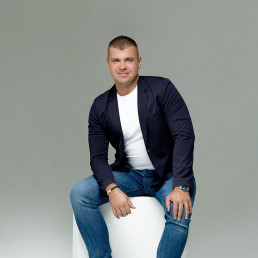
Augustas Alešiūnas
Founder and CEO at ART21, spoke about the factors holding back the digitalization of agriculture and introduced global trends and emerging new business models.
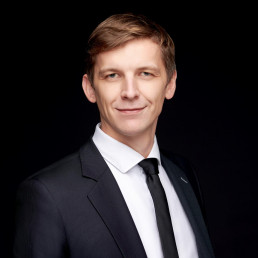
Arnas Radzevičius
Head of Agro Precision Technology Division at Agrokoncernas, talked about the necessary investment in technologies, knowledge and research.
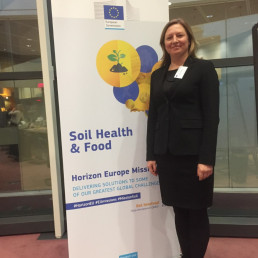
Dr. Zita KrIiaučiūnienė
Assoc. prof. at Vytautas Magnus University, European mission and vision for healthy food and soil.
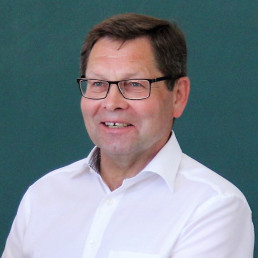
prof. Dr. Vaclovas Bogužas
Head of the Institute of Agroecosystems and Soil Sciences at Vytautas Magnus University, introduced the main principles of healthy and viable soil formation.
In the discussion that followed the presentations, speakers of the webinar answered the questions received from the participants and moderator of the discussion Ramūnas Terleckas, who is the editor at the journal “Verslo klase“.
